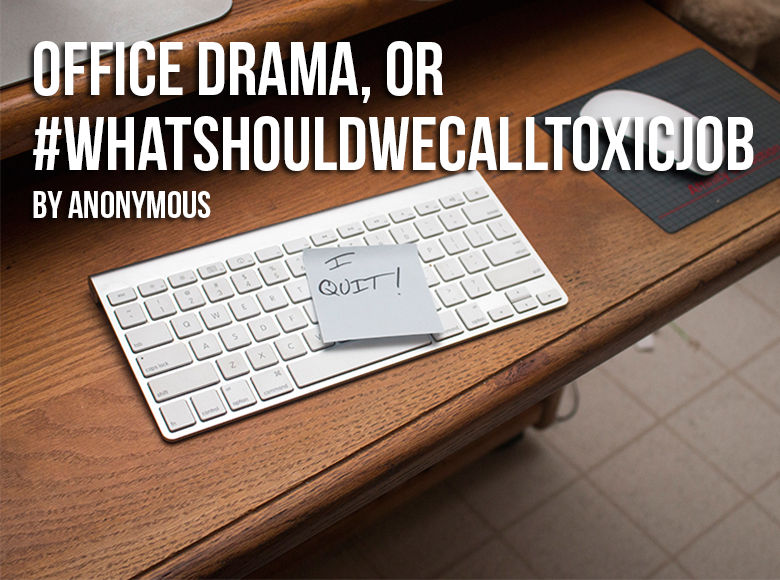How many times do you need to come home from work in tears before you start considering a new job? My last job was terrible almost from the moment it started, but I stayed for nine months trying to make it work, and then trying to hoard enough cash to get out. Looking back on this past year, all I can see is the slow buildup of quiet-yet-demeaning incidents that made me question my worth, my abilities, and my general sense of why I am at all interested in do what I do.
Here is a list of the major red flags.
- When I started my job, there was no training. None! They actually said: “Here is your computer!” and then left me on my own.
- My supervisors act like they don’t trust me, and revise deadlines without telling me. Once, after seeing the timeline for the interviews that I manage, my supervisor approved and implemented it, and then scheduled all the interviews and emailed the schedule to me. She never addressed whether I had done them wrong or late, or any reason why she had done my job for me, even though it was a full week before we had agreed it needed to be done.
- There are three people whom I report to. Every time I ask for clarification on whom I go to for what (even things like time off and emergency situations), they tell me that I was hired because I could “work independently.”
- And then when I ask one of them for help with one of the other departments, they usually fail to answer the question because they get sidetracked, ranting about how pretentious the other department is.
- Once, in a committee meeting, I had an older co-worker stop mid-discussion, turn to me and say “who are you?” I responded with my name and title, and he said, “Oh! I thought you were a student spying on us. Are you even on this committee?” He checked on his phone, found I was, and said, “Oh, well, what can you do?” We had met multiple times.
- When I was introduced to one of the departments, which was formerly all-male, and I’m a young woman, several comments were made to the effect of “Well, now we can’t curse in meetings.”
- Recently, one of my supervisors has been asking me to help her with Excel spreadsheets, and when I turned in a draft (like she asked me to), she brought me into her office and pointed at a column without borders and yelled at me, “Where is the column?! Where is the COLUMN?!? There is no column there!” and then had me redo it.
- I am required to have an autoreply message on my email instructing students how to make appointments. I have gotten back multiple emails from coworkers who are outraged that I would send them appointment instructions. The first sentence is “This is an autoreply.”
- This year, one of my papers was accepted to a prestigious conference. When I asked that same supervisor if there was any funding I could apply for, she said “If you get funding, we might as well add a budget line for my cats.” That was about two months into the position.
- I am frequently asked when I am planning on having children. These are not subtle hints from people I am close with. Coworkers who I rarely interact with have come into my office specifically to ask me when I am planning on getting pregnant.
- After having congratulated me for improving our numbers so much that a particular department might not be at risk anymore, one supervisor came in and told me that the numbers should go up even more because “we haven’t worked that hard
What I’ve learned from this experience is that—surprise!—my happiness really is affected by being treated poorly by the people whom I spend the majority of my day with. I’m really not sure when the turning point was… when I knew I needed to GTFO. I wish I had known when to say something, because maybe things would have gotten better. But by the time I left, I trusted no one that I worked with or for, and I dreaded going to work. I worry I’ll run into coworkers around town and I feel like I’ve developed some really bad work habits (like hiding from my supervisors) that will affect me in the future. My job was affecting my relationships outside of work as well, I was so emotionally drained that I wasn’t myself.
The worst part was that this was supposed to be my dream job—working with exactly the right population in exactly the right role. But my coworkers and terrible supervision ruined it. I put in my two weeks’ notice despite not having something else lined up because not knowing what was coming next was better than being unhappy every day.
Much to my surprise though, leaving my toxic job felt just like a really bad breakup. It probably should have not been surprising, but ah well. My last two weeks were full of utter insanity, and all I could do was hold on to my end date, knowing that it would be over soon. A small sample: My two weeks’ notice was initially rejected so they could “think” (is this legal?). I had more than 12 meetings with all levels of my supervision, where the second question was always “but, your partner isn’t leaving too, is he?” driving home the point that in their minds I was only there because of him. They told me that I would have had a better time in the job if I were “friendlier.” On my last day, none of my supervisors even showed up, wrote an email or left a voice message saying goodbye. And then, as if to tie a big bow on the whole package, about a week after I left, one supervisor sent an email to my personal address about job searching in my field, and how to know if a job is a good fit.
I’ve been free of this job for three full weeks, and let me tell you, life is so much better. If any of the above sounds like your job, get out. ASAP. Don’t wait. If you don’t have a cushion that will let you bail, start sending your resumes faster, network more, do something. It’s not worth being unhappy every day. I also highly recommend just reading the entire archives of Ask a Manager: this helped me figure out the difference between what was simply strange and what actually crossed a boundary, so that I could work up the courage to leave.

Photo by Meaghan Morrison
